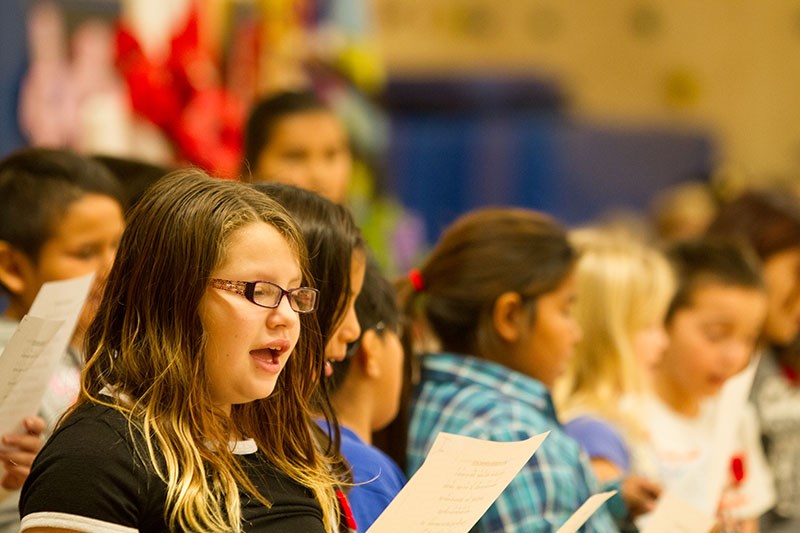Wapanohk Community School hosted its annual ceremony in honour of National Aboriginal Veterans Day Nov. 8, recognizing the contributions of Canada’s indigenous population to the armed forces both today and in the past.
Wapanohk principal Kathleen Kelson opened ceremonies with a speech translated into Cree by vice-principal Selena Dumas.
“We honour our aboriginal veterans today, as many gave up their treaty rights and died for Canada to save our country,” declared Kelson. “We must respect our veterans and hold them dear to our hearts.”
Dignitaries present that morning included elder Nelson Clement, Churchill-Keewatinook Aski MP Niki Ashton, Stacey Martin representing Thompson MLA Kelly Bindle, June Bourguignon of the Royal Canadian Legion, Special Const. Rob Cleveland and Insp. Dave Shuttleworth of the Royal Canadian Mounted Police, deputy mayor Kathy Valentino, Julyda Lagimodiere of the Manitoba Metis Federation, Leslie Tucker and Angele Bartlett of the School District of Mystery Lake, Ryan Land of Vale Manitoba Operations, Wayne Constant of Manitoba Hydro), Thgompson Fire & Emergency Services deputy chief Rick Morris, Manitoba, Kelvin Lynxleg of Manitoba Keewatinowi Okimakanak and Brenda Firman of the University College of the North.
Martha Laubmann was scheduled to represent local aboriginal veteran Percy Laubmann. However, due to health complications, neither could attend. Instead, Bruce Moncur, an Afghanistan veteran who recently moved to Thompson, was invited to share his experiences.
Moncur served with the Canadian Armed Forces for several years before being severely wounded in Operation Medusa, through which Canada established initial control over Kandahar province. He recalled serving with many aboriginal soldiers overseas: he singled out Jason Funnell, a personal friend who received Canada’s second-highest honour for military service, the medal of military honour, for endangering his own life to save others during the same operation in 2007.
For much of Canada’s history, Moncur noted, military service for indigenous individuals was thankless work. “135 000 Canadians lost their lives in World War II, thousands of them indigenous, to protect our country. But I also know that until 1960, many didn’t have the right to vote. Can you imagine signing up to serve your country, coming home, and not being able to vote for another 15 years afterwards?”
Martin noted that the provincial government was honouring Sgt. Thomas “Tommy” Prince, who had served in both the Second World War and the Korean War, and was Canada’s most decorated indigenous veteran, with the unveiling of a plaque at the legislature in Winnipeg on Tuesday. Prince, Martin noted, “had a strong sense of duty, and a fierce pride in his people,” and served to show Canadian society what aboriginal people were capable of contributing to the Canadian enterprise.
But Prince’s return home was characterized by racism and resentment, and the thanks he has received for his service has come late. “We need to learn from that history, and make sure we work with veterans when they come home,” said Ashton
Lynxleg implored the youth present not to waste the sacrifice of Canada’s veterans, aboriginal or otherwise. “We have a bright future ahead of us. You have a bright future ahead of you. Every day you can wake up and make good decisions, because our ancestors and other citizens fought for us so that we could make those choices today.”
The presentations also featured performances from students, including a Cree rendition of “Amazing Grace” by the Grade 6 classes, as well as a reading of “In Flanders Fields” and a singing of “The Strangest Dream” by Jacqueline Lafreniere’s Grade 4 class.




